#unpersonnel
Explore tagged Tumblr posts
Text
Convention on the safety of the United Nations and Associated personnel.
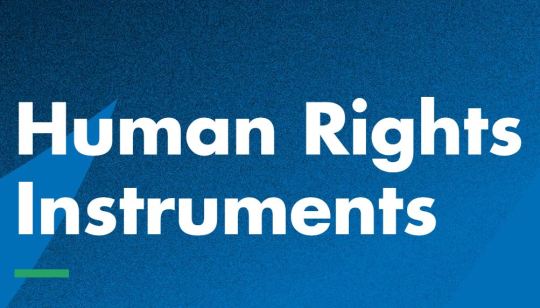
This Convention applies in respect of United Nations and associated personnel and United Nations operations, as defined in article 1. This Convention shall not apply to a United Nations operation authorized by the United Nations Security Council as an enforcement action under Chapter VII of the Charter of the United Nations in which any of the personnel are engaged as combatants against organized armed forces and to which the law of international armed conflict applies. Article 3 -Identification
The military and police components of a United Nations operation and their vehicles, vessels and aircraft shall bear distinctive identification. Other personnel, vehicles, vessels and aircraft involved in the United Nations operation shall be appropriately identified unless otherwise decided by the Secretary-General of the United Nation; All United Nations and associated personnel shall carry appropriate identification documents. Article 4 - Agreements on the status of the operation The host State and the United Nations shall conclude as soon as possible an agreement on the status of the United Nations operation and all personnel engaged in the operation including, inter alia, provisions on privileges and immunities for military and police components of the operation. Article 5 - Transit A transit State shall facilitate the unimpeded transit of United Nations and associated personnel and their equipment to and from the host State. Article 6 - Respect for laws and regulations
Without prejudice to such privileges and immunities as they may enjoy or to the requirements of their duties, United Nations and associated personnel shall: (a) Respect the laws and regulations of the host State and the transit State; and (b) Refrain from any action or activity incompatible with the impartial and international nature of their duties. The Secretary-General of the United Nations shall take all appropriate measures to ensure the observance of these obligations. Article 7 - Duty to ensure the safety and security of United Nations and associated personnel
United Nations and associated personnel, their equipment and premises shall not be made the object of attack or of any action that prevents them from discharging their mandate. States Parties shall take all appropriate measures to ensure the safety and security of United Nations and associated personnel. In particular, States Parties shall take all appropriate steps to protect United Nations and associated personnel who are deployed in their territory from the crimes set out in article 9. States Parties shall cooperate with the United Nations and other States Parties, as appropriate, in the implementation of this Convention, particularly in any case where the host State is unable itself to take the required measures. Article 8 - Duty to release or return
United Nations and associated personnel captured or detained Except as otherwise provided in an applicable status-of-forces agreement, if United Nations or associated personnel are captured or detained in the course of the performance of their duties and their identification has been established, they shall not be subjected to interrogation and they shall be promptly released and returned to United Nations or other appropriate authorities. Pending their release such personnel shall be treated in accordance with universally recognized standards of human rights and the principles and spirit of the Geneva Conventions of 1949. Article 9 - Crimes against United Nations and associated personnel
The intentional commission of: (a) A murder, kidnapping or other attack upon the person or liberty of any United Nations or associated personnel; (b) A violent attack upon the official premises, the private accommodation or the means of transportation of any United Nations or associated personnel likely to endanger his or her person or liberty; (c) A threat to commit any such attack with the objective of compelling a physical or juridical person to do or to refrain from doing any act; (d) An attempt to commit any such attack; and (e) An act constituting participation as an accomplice in any such attack, or in an attempt to commit such attack, or in organizing or ordering others to commit such attack, shall be made by each State Party a crime under its national law. Each State Party shall make the crimes set out in paragraph 1 punishable by appropriate penalties which shall take into account their grave nature. Article 10 - Establishment of jurisdiction
Each State Party shall take such measures as may be necessary to establish its jurisdiction over the crimes set out in article 9 in the following cases: (a) When the crime is committed in the territory of that State or on board a ship or aircraft registered in that State; (b) When the alleged offender is a national of that State. A State Party may also establish its jurisdiction over any such crime when it is committed: (a) By a stateless person whose habitual residence is in that State; or (b) With respect to a national of that State; or (c) In an attempt to compel that State to do or to abstain from doing any act. Any State Party which has established jurisdiction as mentioned in paragraph 2 shall notify the Secretary-General of the United Nations. If such State Party subsequently rescinds that jurisdiction, it shall notify the Secretary-General of the United Nations. Each State Party shall take such measures as may be necessary to establish its jurisdiction over the crimes set out in article 9 in cases where the alleged offender is present in its territory and it does not extradite such person pursuant to article 15 to any of the States Parties which have established their jurisdiction in accordance with paragraph 1 or 2. This Convention does not exclude any criminal jurisdiction exercised in accordance with national law. Article 11 - Prevention of crimes against United Nations and associated personnel
States Parties shall cooperate in the prevention of the crimes set out in article 9, particularly by: (a) Taking all practicable measures to prevent preparations in their respective territories for the commission of those crimes within or outside their territories; and (b) Exchanging information in accordance with their national law and coordinating the taking of administrative and other measures as appropriate to prevent the commission of those crimes. Article 12 - Communication of information
Under the conditions provided for in its national law, the State Party in whose territory a crime set out in article 9 has been committed shall, if it has reason to believe that an alleged offender has fled from its territory, communicate to the Secretary-General of the United Nations and, directly or through the Secretary-General, to the State or States concerned all the pertinent facts regarding the crime committed and all available information regarding the identity of the alleged offender. Whenever a crime set out in article 9 has been committed, any State Party which has information concerning the victim and circumstances of the crime shall endeavour to transmit such information, under the conditions provided for in its national law, fully and promptly to the Secretary-General of the United Nations and the State or States concerned. Article 13 - Measures to ensure prosecution or extradition
Where the circumstances so warrant, the State Party in whose territory the alleged offender is present shall take the appropriate measures under its national law to ensure that person’s presence for the purpose of prosecution or extradition.
Measures taken in accordance with paragraph 1 shall be notified, in conformity with national law and without delay, to the Secretary-General of the United Nations and, either directly or through the Secretary-General, to: (a) The State where the crime was committed; (b) The State or States of which the alleged offender is a national or, if such person is a stateless person, in whose territory that person has his or her habitual residence; (c) The State or States of which the victim is a national; and (d) Other interested States. Article 14 - Prosecution of alleged offenders The State Party in whose territory the alleged offender is present shall, if it does not extradite that person, submit, without exception whatsoever and without undue delay, the case to its competent authorities for the purpose of prosecution, through proceedings in accordance with the law of that State. Those authorities shall take their decision in the same manner as in the case of an ordinary offence of a grave nature under the law of that State. Article 15 - Extradition of alleged offenders
To the extent that the crimes set out in article 9 are not extraditable offences in any extradition treaty existing between States Parties, they shall be deemed to be included as such therein. States Parties undertake to include those crimes as extraditable offences in every extradition treaty to be concluded between them. If a State Party which makes extradition conditional on the existence of a treaty receives a request for extradition from another State Party with which it has no extradition treaty, it may at its option consider this Convention as the legal basis for extradition in respect of those crimes. Extradition shall be subject to the conditions provided in the law of the requested State. States Parties which do not make extradition conditional on the existence of a treaty shall recognize those crimes as extraditable offences between themselves subject to the conditions provided in the law of the requested State. Each of those crimes shall be treated, for the purposes of extradition between States Parties, as if it had been committed not only in the place in which it occurred but also in the territories of the States Parties which have established their jurisdiction in accordance with paragraph 1 or 2 of article 10. Article 16 - Mutual assistance in criminal matters
States Parties shall afford one another the greatest measure of assistance in connection with criminal proceedings brought in respect of the crimes set out in article 9, including assistance in obtaining evidence at their disposal necessary for the proceedings. The law of the requested State shall apply in all cases.
The provisions of paragraph 1 shall not affect obligations concerning mutual assistance embodied in any other treaty. Article 17- Fair treatment
Any person regarding whom investigations or proceedings are being carried out in connection with any of the crimes set out in article 9 shall be guaranteed fair treatment, a fair trial and full protection of his or her rights at all stages of the investigations or proceedings. Any alleged offender shall be entitled: (a) To communicate without delay with the nearest appropriate representative of the State or States of which such person is a national or which is otherwise entitled to protect that person’s rights or, if such person is a stateless person, of the State which, at that person’s request, is willing to protect that person’s rights; and (b) To be visited by a representative of that State or those States. Article 18 - Notification of outcome of proceedings The State Party where an alleged offender is prosecuted shall communicate the final outcome of the proceedings to the Secretary-General of the United Nations, who shall transmit the information to other States Parties. Article 19 - Dissemination The States Parties undertake to disseminate this Convention as widely as possible and, in particular, to include the study thereof, as well as relevant provisions of international humanitarian law, in their programmes of military instruction. Article 20 - Savings clauses Nothing in this Convention shall affect: (a) The applicability of international humanitarian law and universally recognized standards of human rights as contained in international instruments in relation to the protection of United Nations operations and United Nations and associated personnel or the responsibility of such personnel to respect such law and standards; (b) The rights and obligations of States, consistent with the Charter of the United Nations, regarding the consent to entry of persons into their territories; (c) The obligation of United Nations and associated personnel to act in accordance with the terms of the mandate of a United Nations operation; (d) The right of States which voluntarily contribute personnel to a United Nations operation to withdraw their personnel from participation in such operation; or (e) The entitlement to appropriate compensation payable in the event of death, disability, injury or illness attributable to peace-keeping service by persons voluntarily contributed by States to United Nations operations. Article 21 - Right of self-defence Nothing in this Convention shall be construed so as to derogate from the right to act in self-defence. Article 22 - Dispute settlement
Any dispute between two or more States Parties concerning the interpretation or application of this Convention which is not settled by negotiation shall, at the request of one of them, be submitted to arbitration. If within six months from the date of the request for arbitration the parties are unable to agree on the organization of the arbitration, any one of those parties may refer the dispute to the International Court of Justice by application in conformity with the Statute of the Court. Each State Party may at the time of signature, ratification, acceptance or approval of this Convention or accession thereto declare that it does not consider itself bound by all or part of paragraph 1. The other States Parties shall not be bound by paragraph 1 or the relevant part thereof with respect to any State Party which has made such a reservation. Any State Party which has made a reservation in accordance with paragraph 2 may at any time withdraw that reservation by notification to the Secretary-General of the United Nations. Article 23 - Review meetings At the request of one or more States Parties, and if approved by a majority of States Parties, the Secretary-General of the United Nations shall convene a meeting of the States Parties to review the implementation of the Convention, and any problems encountered with regard to its application. Article 24 - Signature This Convention shall be open for signature by all States, until 31 December 1995, at United Nations Headquarters in New York. Article 25 - Ratification, acceptance or approval This Convention is subject to ratification, acceptance or approval. Instruments of ratification, acceptance or approval shall be deposited with the Secretary-General of the United Nations. Article 26 Accession This Convention shall be open for accession by any State. The instruments of accession shall be deposited with the Secretary-General of the United Nations. Article 27 -Entry into force
This Convention shall enter into force thirty days after twenty-two instruments of ratification, acceptance, approval or accession have been deposited with the Secretary-General of the United Nations. For each State ratifying, accepting, approving or acceding to the Convention after the deposit of the twenty-second instrument of ratification, acceptance, approval or accession, the Convention shall enter into force on the thirtieth day after the deposit by such State of its instrument of ratification, acceptance, approval or accession. Article 28 - Denunciation
A State Party may denounce this Convention by written notification to the Secretary-General of the United Nations. Denunciation shall take effect one year following the date on which notification is received by the Secretary-General of the United Nations. Article 29 - Authentic texts The original of this Convention, of which the Arabic, Chinese, English, French, Russian and Spanish texts are equally authentic, shall be deposited with the Secretary-General of the United Nations, who shall send certified copies thereof to all States.
#A/RES/49/59#Associated personnel#unstaff#unpersonnel#unity#universality#convention#detaineesstaffday#protectunstaff#United Nations Security Council#united nations secretary general#ohchr#international law#international instruments#international human rights treaties#arbitrary detention#detention and imprisonment#detained staff members#detention#category of detainees#case of imprisonment#foreign affairs#human rights commission
0 notes
Text
Pledging to protect and support humanitarians as they help build a more peaceful, humane world for us all.

Today is a solemn reminder of the grave risks facing our staff members as they carry out their vital work under the United Nations flag.
These brave women and men represent humanity’s highest calling: helping people in their hour of desperate need. They come from countries spanning the globe, but are united in their common dedication to the noble causes of peacekeeping, delivering aid and assistance, and upholding international law and human rights in countries and regions rocked by conflict and disaster.
They also face enormous and unacceptable risks — including violence, detention and abduction. Since 2022, 381 UN personnel have been detained — including 7 in January and February of this year. In total, 27 UN personnel are still in detention.
Our hearts are with their families and colleagues, and I will not relent in calling for their release and safe return.
In their name, we urge all countries to fully implement the 1994 Convention on the Safety of United Nations and Associated Personnel, and the 2005 Optional Protocol to the Convention.
On this important day, let’s honor the courage and dedication of humanitarians everywhere by pledging to protect and support them as they help build a more peaceful, humane world for us all.
António Guterres.
Statement from the UN Secretary-General António Guterres on the International Day of Solidarity with Detained and Missing Staff Members 2024; March 25th.
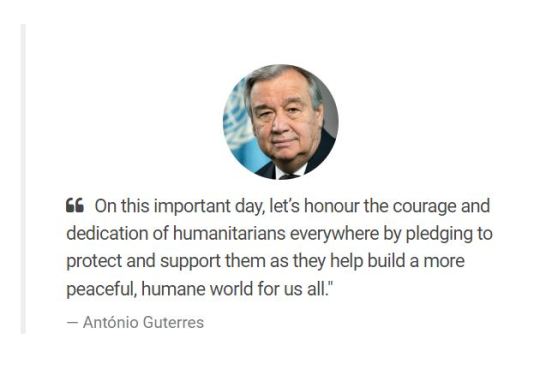
#un staff members#unstaff#unpersonnel#25march#detaineesstaffday#united nations secretary general#united nations security council#international law#international instruments#international human rights treaties#national and international courts and tribunals
0 notes
Text
Adopt the International rules and standards for policing.
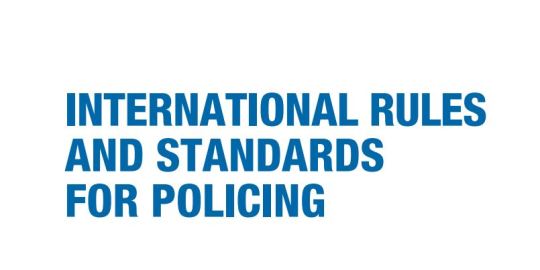
The overall objective is to promote respect for the law that protects people in such circumstances.
The United Nations was created in 1945 in order to promote and maintain peace and security. Its founding instrument is the Charter of the United Nations (UN Charter). This document contains an important commitment to human rights in Article 55. Three major instruments that codified human rights at the universal level together form what is often referred to today as the International Bill of Human Rights:
The Universal Declaration of Human Rights (UDHR), which was adopted by the General Assembly of the United Nations in 1948;
The International Covenant on Economic, Social and Cultural Rights, which was adopted in 1966, and its Optional Protocol of 2008;
The International Covenant on Civil and Political Rights, which was adopted in 1966, and its two Optional Protocols.
The UDHR had a major impact on subsequent universal and regional human rights treaties as well as on national constitutions and other laws. As a consequence, there are a number of provisions that can today be considered customary law, e.g. the prohibition of torture and other forms of ill-treatment, the prohibition of racial discrimination and the prohibition of slavery. Following the International Bill of Human Rights, a number of treaties were drafted that dealt with specific topics. They include the following:
International Convention on the Elimination of All Forms of Racial Discrimination (CERD);
Convention on the Elimination of All Forms of Discrimination against Women (CEDAW) and its Optional Protocol;
Convention against Torture and Other Cruel, Inhuman or Degrading Treatment or Punishment (CAT) and its Optional Protocol (OPCAT);
Convention on the Rights of the Child (CRC) and its Optional Protocols on the involvement of children in Charter of the United Nations, Article 55 “The United Nations shall promote […] universal respect for, and observance of, human rights and fundamental freedoms for all without distinction as to race, sex, language, or religion.”
International law on armed conflict and on the sale of children, child prostitution and child pornography.
International human rights treaties that are binding on all States Parties (and their agents) are increasingly complemented by soft law documents that provide guidance and establish more detailed human rights standards. In addition to the two soft law documents already mentioned (CCLEO and BPUFF), the following soft law documents, are of particular relevance to law enforcement officials:
Standard Minimum Rules for the Treatment of Prisoners (SMR);
Body of Principles for the Protection of All Persons under Any Form of Detention or Imprisonment;
Declaration of Basic Principles of Justice for Victims of Crime and Abuse of Power (Victims Declaration)
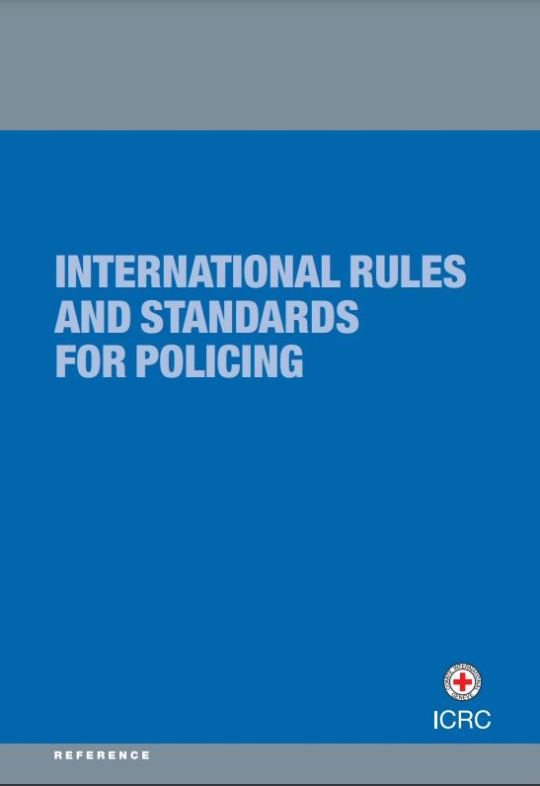
#International law#international human rights law#law enforcement#law#enforcement agencies#armed conflict#situation of violence#protectunstaff#unpersonnel#unstaff#Humanity#impartiality#neutrality#independence#voluntary service#unity#universality#humanitarian organizations#law enforcement organizations#International human rights treaties
0 notes
Text
Human Rights Committee General Comment 35, Article 9 (Liberty and Security of Person).

International human rights law provides a clear and universal framework relating to detention, enshrined by the following standards:
United Nations CCPR/C/GC/35.
The right to take proceedings for release from unlawful or arbitrary detention.
Paragraph 4 of article 9 entitles anyone who is deprived of liberty by arrest or detention to take proceedings before a court, in order that the court may decide without delay on the lawfulness of the detention and order release if the detention is not lawful. It enshrines the principle of habeas corpus. may, in appropriate circumstances, be limited to review of the reasonableness of a prior determination.
The right applies to all detention by official action or pursuant to official authorization, including detention in connection with criminal proceedings, military detention, security detention, counter-terrorism detention, involuntary hospitalization, immigration detention, detention for extradition and wholly groundless arrests. It also applies to detention for vagrancy or drug addiction, detention for educational purposes of children in conflict with the law and other forms of administrative detention. Detention within the meaning of paragraph 4 also includes house arrest and solitary confinement. When a prisoner is serving the minimum duration of a prison sentence as decided by a court of law after a conviction, either as a sentence for a fixed period of time or as the fixed portion of a potentially longer sentence, paragraph 4 does not require subsequent review of the detention.
The object of the right is release (either unconditional or conditional) from ongoing unlawful detention; compensation for unlawful detention that has already ended is addressed in paragraph 5. Paragraph 4 requires that the reviewing court must have the power to order release from the unlawful detention.132 When a judicial order of release under paragraph 4 becomes operative (exécutoire), it must be complied with immediately, and continued detention would be arbitrary in violation of article 9, paragraph 1.
The right to bring proceedings applies in principle from the moment of arrest and any substantial waiting period before a detainee can bring a first challenge to detention is impermissible.134 In general, the detainee has the right to appear in person before the court, especially where such presence would serve the inquiry into the lawfulness of detention or where questions regarding ill-treatment of the detainee arise. The court must have the power to order the detainee brought before it, regardless of whether the detainee has asked to appear.
Unlawful detention includes detention that was lawful at its inception but has become unlawful because the individual has completed serving a sentence of imprisonment or the circumstances that justify the detention have changed. After a court has held that the circumstances justify the detention, an appropriate period of time may pass, depending on the nature of the relevant circumstances, before the individual is entitled to take proceedings again on similar grounds.
“Unlawful” detention includes both detention that violates domestic law and detention that is incompatible with the requirements of article 9, paragraph 1, or with any other relevant provision of the Covenant. While domestic legal systems may establish differing methods for ensuring court review of detention, paragraph 4 requires that there be a judicial remedy for any detention that is unlawful on one of those grounds.139 For example, the power of a family court to order release of a child from detention that is not in the child’s best interests may satisfy the requirements of paragraph 4 in relevant cases.
Paragraph 4 entitles the individual to take proceedings before “a court,” which should ordinarily be a court within the judiciary. Exceptionally, for some forms of detention, legislation may provide for proceedings before a specialized tribunal, which must be established by law and must either be independent of the executive and legislative branches or enjoy judicial independence in deciding legal matters in proceedings that are judicial in nature.
Paragraph 4 leaves the option of taking proceedings to the persons being detained or those acting on their behalf; unlike paragraph 3, it does not require automatic initiation of review by the authorities detaining an individual. Laws that exclude a particular category of detainees from the review required by paragraph 4 violate the Covenant. Practices that render such review effectively unavailable to an individual, including incommunicado detention, also amount to a violation. To facilitate effective review, detainees should be afforded prompt and regular access to counsel. Detainees should be informed, in a language they understand, of their right to take proceedings for a decision on the lawfulness of their detention.
Persons deprived of liberty are entitled not merely to take proceedings, but to receive a decision, and without delay. The refusal by a competent court to take a decision on a petition for the release of a detained person violates paragraph 4. The adjudication of the case should take place as expeditiously as possible. Delays attributable to the petitioner do not count as judicial delay
The Covenant does not require that a court decision upholding the lawfulness of detention be subject to appeal. If a State party does provide for appeal or further instances, the delay may reflect the changing nature of the proceeding and in any event must not be excessive.
#united nations human rights council#unpersonnel#unstaff#detained staff members#detention and imprisonment#detention#Liberty and Security of Person#international instruments#national and international courts and tribunals#International human rights law#right to compensation#unlawful arrest#arbitrary detention#category of detainees#person deprived of liberty
0 notes
Text
United Nations Standard Minimum Rules for the Administration of Juvenile Justice (“Beijing Rules”).
International human rights law provides a clear and universal framework relating to detention, enshrined by the following standards:
United Nations Standard Minimum Rules for the Administration of Juvenile Justice (“Beijing Rules”)

#Juvenile Justice#detention and imprisonment#unstaff#25march#unpersonnel#Beijing Rules#national and international courts and tribunals#international human rights law#united nations human rights council#International Instruments
0 notes
Text
Secretary-General's message on the International Day of Solidarity with Detained and Missing Staff Members 2024.
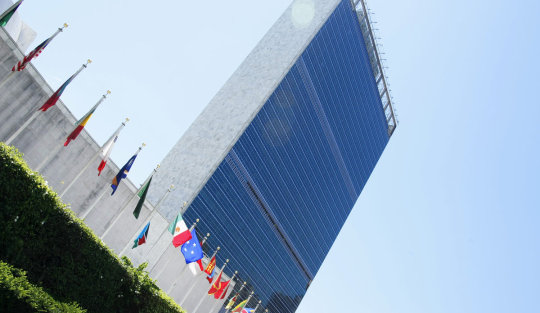
Today is a solemn reminder of the grave risks facing our staff members as they carry out their vital work under the United Nations flag.
These brave women and men represent humanity’s highest calling: helping people in their hour of desperate need. They come from countries spanning the globe, but are united in their common dedication to the noble causes of peacekeeping, delivering aid and assistance, and upholding international law and human rights in countries and regions rocked by conflict and disaster.
They also face enormous and unacceptable risks — including violence, detention and abduction. Since 2022, 381 UN personnel have been detained — including 7 in January and February of this year. In total, 27 UN personnel are still in detention.
Our hearts are with their families and colleagues, and I will not relent in calling for their release and safe return.
In their name, we urge all countries to fully implement the 1994 Convention on the Safety of United Nations and Associated Personnel, and the 2005 Optional Protocol to the Convention.
On this important day, let’s honour the courage and dedication of humanitarians everywhere by pledging to protect and support them as they help build a more peaceful, humane world for us all.
#detaineesstaffday#protectunstaff#unpersonnel#international laws#human rights#Convention on the Safety of United Nations and Associated Personne#honour the courage and dedication#pledging to protect and support#unstaff#25march#statements#united nations secretary general
0 notes
Link
0 notes
Link
For the purposes of the Body of Principles:
(a) "Arrest" means the act of apprehending a person for the alleged commission of an offence or by the action of an authority;
(b) "Detained person" means any person deprived of personal liberty except as a result of conviction for an offence;
(c) "Imprisoned person" means any person deprived of personal liberty as a result of conviction for an offence;
(d) "Detention" means the condition of detained persons as defined above;
(e) "Imprisonment" means the condition of imprisoned persons as defined above;
(f) The words "a judicial or other authority" means a judicial or other authority under the law whose status and tenure should afford the strongest possible guarantees of competence, impartiality and independence.
0 notes
Link
Appealing to all States in which United Nations and associated personnel are deployed and to all others on whom such personnel may rely, to provide comprehensive support aimed at facilitating the conduct and fulfilling the mandate of United Nations operations,
Convinced that there is an urgent need to adopt appropriate and effective measures for the prevention of attacks committed against United Nations and associated personnel and for the punishment of those who have committed such attacks,
United Nations Security Council.
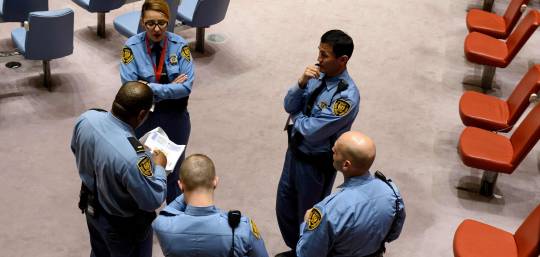
0 notes